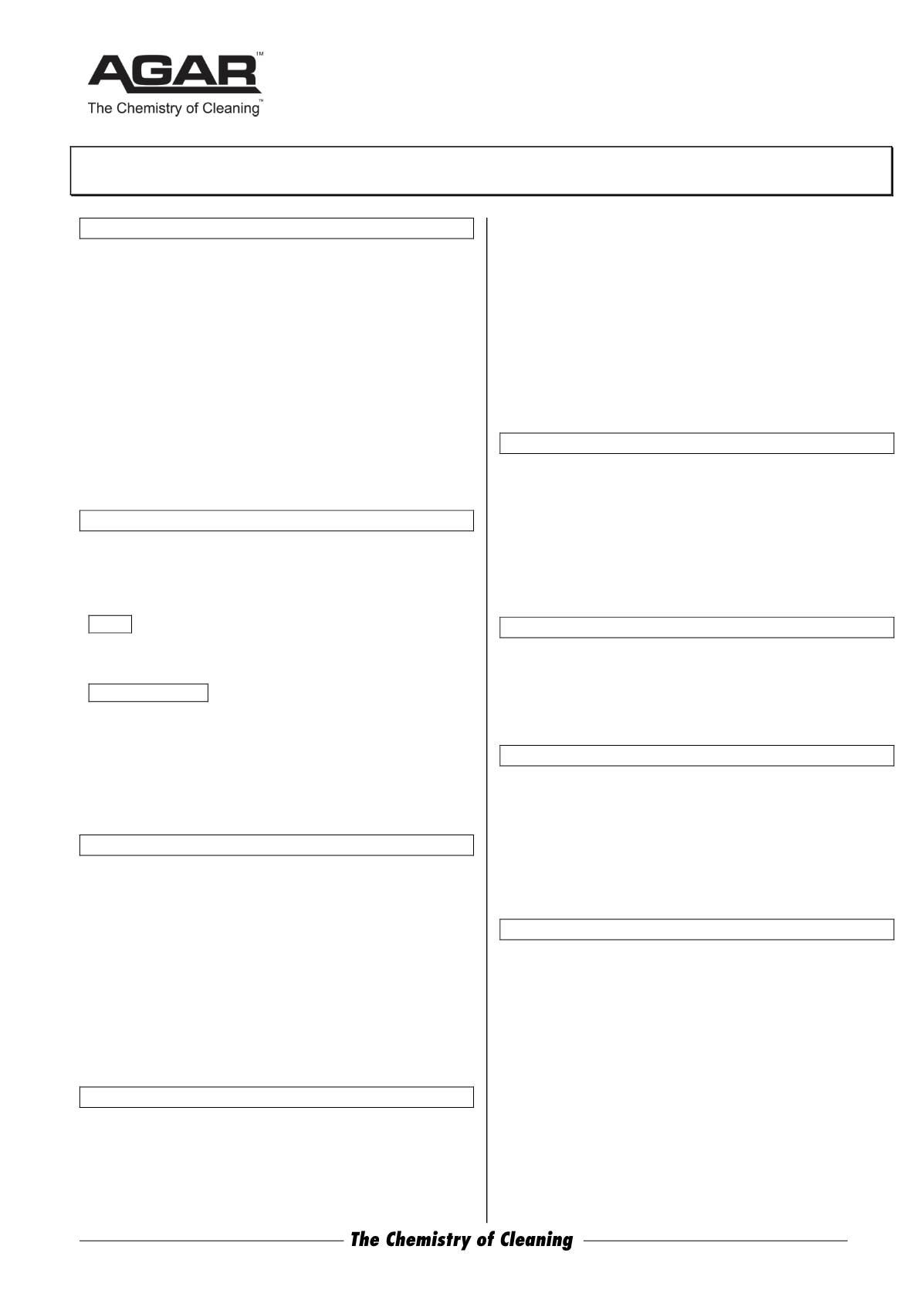

ABN 80 004 726 890 | MADE IN AUSTRALIA
VIC 03 9480 3000
NSW 02 9743 6020
SA 08 8293 2020
QLD 07 3274 3438
WA 08 9249 4566
Safety Data Sheet
Issued: December 18, 2015
Page 1 of 2
METAL-MAX
1 IDENTIFICATION OF THE MATERIAL AND SUPPLIER
Product Name:
METAL-MAX
Other Names: None
Manufacturer's Product Code: META1
Product Use: Metal polish for stainless steel, chrome, copper
and brass.
COMPANY DETAILS
Company: Agar Cleaning Systems Pty. Ltd.
Address: 12-14 Cope Street, Preston, Vic. 3072
Telephone: 03 9480 3000 Facsimile: 03 9480 5100
Web:
www.agar.com.auAgar SDS are available from this website.
E-mail:
admin@agar.com.auEmergency Telephone Number: 131 126
(Aust wide)
2 HAZARDS IDENTIFICATION
Hazardous according to criteria of Safe Work Australia.
Harmful Xn. Irritant Xi.
Not classed as Dangerous Goods.
Risks:
Irritating to eyes and skin. [R36/38]
Harmful by inhalation and if swallowed. [R20/22]
Safety Directions:
In case of contact with eyes, rinse immediately
with plenty of water and seek medical advice. [S26]
Wear suitable gloves. [S37]
Metal-Max becomes non-hazardous at concentrations below
50%
3 COMPOSITION / INFORMATION ON INGREDIENTS
Ingredients:
Chemical Entity: CAS No.: Proportion:
Surfactants (coco based)
non-haz
10 - < 30%
Calcined kaolin 66402-68-4 10 - <30%
Silica-crystalline quartz* 14808-60-7 < 0.09%
Glycolic acid
79-14-1
10 - < 30%
Lime oils
non-haz
< 10%
Blue dye
-
< 10%
Water and 7732-18-5
other non-hazardous ingredients to 100%
* Crystalline quartz is a trace component of the calcined kaolin
clay.
4 FIRST AID MEASURES
Poisons Information Centre: Phone 131 126
Swallowed:
If poisoning occurs, contact a doctor or Poisons
Information Centre. If swallowed give two glasses of water to
drink. Rinse mouth with water. Never give anything by mouth
to an unconscious person.
Eye:
Immediately hold the eyes open and wash continuously
for at least 15 minutes with fresh running water. Ensure
irrigation under eyelids by occasionally lifting the upper and
lower lids. Transport to hospital or doctor without delay.
Removal of contact lenses after an eye injury should only be
undertaken by skilled personnel.
Skin:
Remove any contaminated clothing and flush area with
water and soap if available. Seek medical attention in the
event of irritation.
Inhaled:
Remove affected person to fresh air. Lay patient
down, keep warm and rested. If breathing is shallow or has
stopped, ensure clear airway and apply resuscitation. Call a
doctor.
5 FIRE FIGHTING MEASURES
Fire/Explosion Hazard: Metal-Max is not combustible.
Fire Extinguishing media: Water spray or fog. Foam. Dry
chemical powder. Carbon dioxide.
Special fire-fighting procedures: None.
Unusual fire hazards: None.
Hazardous products of combustion: Thermal decomposition at
temperatures above 200ºC or in a large fire may yield toxic
fumes which my cause severe eye, nose, throat and lung
irritation. Use adequate ventilation.
6 ACCIDENTAL RELEASE MEASURES
Clean up all spills immediately. Spills may be slippery. Avoid
contact with skin and eyes. Contain spill and mop up. Place in a
suitable, labelled container for waste disposal.
If spilled on clothing, remove and launder before re-use.
7 HANDLING AND STORAGE
Handling: When using this product, keep it wet either with water
or more product. Avoid drying it out which may produce dust
which is harmful if inhaled.
Storage and Transport: Store in a cool, dry place.
Incompatibility (Materials to avoid for purposes of transport,
handling and storage only): None.
8 EXPOSURE CONTROLS / PERSONAL PROTECTION
Exposure Standards: None assigned for this mixture. If the
product dries out, a solid powdery residue may be left. The
dust from this residue may be harmful if inhaled. There may
be trace quantities of crystalline silica present:
Atmospheric Contaminant Exposure Standard for:
Silica-crystalline (a potential residual product)
CAS No. 14808-60-7 TWA = - ppm (0.1 mg/cu.m)
STEL = -
[Source: Safe Work Australia HSIS- 2015]
Engineering Controls: Mechanical ventilation: Not required
under normal conditions.
Personal Protection:
Gloves - Wear rubber gloves to prevent skin contact.
Eye-protection - Safety glasses.
Respiratory – Use with adequate ventilation. If any dust is
generated, wear a suitable respirator.
Please turn to page 2.


















